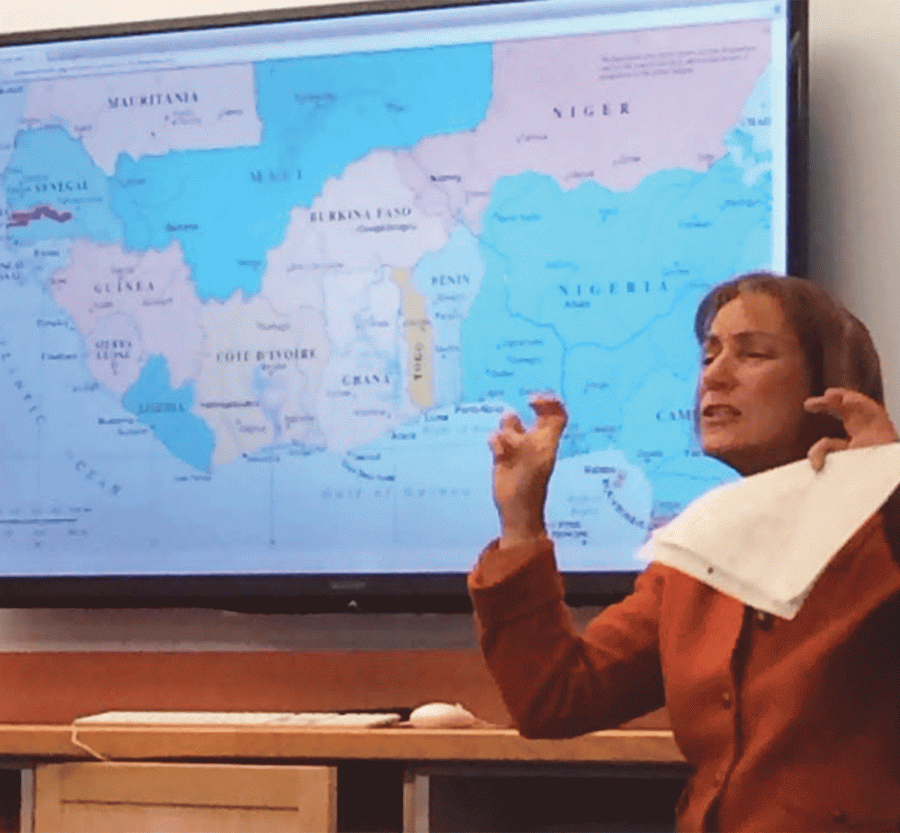Professor Discusses Feminism in Africa
The Women’s Studies lounge in the basement of East Hall was buzzing with activity on Thursday, October 23 as students and faculty sat down to learn about feminism in West Africa. Professor of Anthropology and Africana & Latin American Studies Mary Moran spoke of the conflicts of understanding that feminist theorists, activists, and international feminist organizations have with female-bodied individuals in West Africa, specifically Nigeria.
The event was co-sponsored by Women’s Studies and the African Students’ Union, and was organized by sophomore Antoinette Nwabunnia and Women’s Studies Program Assistant Che Hatter. The brown bag was a part of African Appreciation Week and was accompanied by a screening of the film based on Chimamande Adiche’s novel of the same name, Half of A Yellow Sun. The novel and film were about the two sisters and their families in the midst of the Nigerian Civil War in the late 1960s. As Professor Mary Moran pointed out, it was particularly important that the film and novel depicted the women within the relational contexts of their families.
“Gender is not a useful unit of analysis in West Africa,” Moran said. “Rather, an individual’s identity is shaped by many other social factors.”
Here, Professor Moran draws on concepts of gender from Nigerian theorist Oyeronke Oyewumi’s book The Invention of Women. The theory essentially argues that the Western idea of an individual’s experience and identity as most significantly shaped by their embodiment does not apply in Africa. For example, a wife may be a subordinate role in relation to men, but a mother or sister or aunt is a dominant role, and it’s unrealistic to describe women as sharing in experience just because of their anatomy. In truth, context is key.
Given the interaction between the rest of the world and places of political unrest in Africa, conflicts have arisen between the assumptions of Western feminism and the realities of women in West Africa, particularly in regards to the Global Feminist Intervention industry. The industry is comprised of a series of NGOs whose mission is to help women specifically in Africa. Although well-intentioned, this mission can become problematic. For instance, a particular NGO wanted to provide services to victims of rape in West Africa. In order to receive these services, an individual has to permanently identify as a victim of rape, as though it was the most important event of their lives, and that their victimhood defined them.
“The conflict is often between Western activists on the ground, who have the funds and make the decisions, and the West African women,” Moran said.
Activists often misread gender and relational statuses, and end up putting women into categories that are incorrect and not helpful to the West African women.
In opposition to this status of “victimhood,” collective action among women in West Africa has a long-standing tradition as a legitimate form of activism. Professor Moran said that she has witnessed approximately 200 women march on a regional capital in Liberia to contest a new tax that they saw as mainly affecting them, who were the primary “breadwinners” in their homes. There is also a tradition of protests, marches and even collective violence against men as a means for female-bodied citizens to express their discontents or even their lack of respect for the government.
Perhaps these are feminist acts, but not under the Western idea. Instead, these women are acting and reacting within their own traditions, asserting their own identities without the connotation of victimhood, outside of the realm of Western feminist assumptions.






